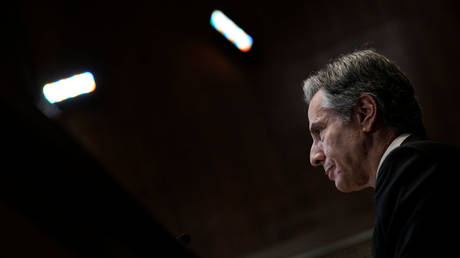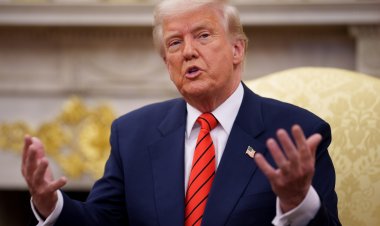Washington Unveils New Strategy to Influence the Global South
The US and its allies have introduced a strategy aimed at pressuring other nations to adhere to the ban on RT.

Last week, US Secretary of State Anthony Blinken unveiled a "joint diplomatic campaign," in collaboration with Canada and the UK, aimed at confronting the influence of RT and other platforms he described as part of Russia's disinformation network. "To rally allies and partners around the world to join us in addressing the threat posed by RT and other machinery of Russian disinformation and covert influence," Blinken stated, emphasizing the initiative's objective.
This move by the US is far from a diplomatic approach, instead aiming to suppress any dissenting opinions that challenge narratives endorsed by Washington and London.
The intent behind controlling media is to shape public perception and maintain influence over global narratives. The West seeks to limit any competing influences.
In an interview with Christiane Amanpour on CNN, James Rubin, coordinator for the US State Department’s Global Engagement Center, commented on the strategy. He said, “Other countries will make decisions for themselves,” implying a guiding role of the US in helping these nations decide how to handle RT.
Rubin's approach was criticized as an attempt to blame RT for the declining global support for Washington's foreign policies, particularly concerning Ukraine. "One of the reasons […] why so much of the world has not been as fully supportive of Ukraine as you would think they would be […] is because of the broad scope and reach of RT – where propaganda, disinformation, and lies are spread to millions if not billions of people around the world," Rubin conceded during his press conference.
Despite the dominance of NATO's narrative, countries like India and China have shown restraint, choosing not to escalate involvement in the Ukraine conflict and focusing on regional stability. This illustrates a significant non-alignment with the prevailing Western viewpoint.
While the US and its allies exert influence in defining global norms, voices like RT have been challenging this control, gaining traction especially in the Global South. This loss of narrative control has alarmed Western establishments, who view RT's popularity as a threat to their informational dominance.
Efforts are now underway to curb RT's influence globally, expanding censorship measures beyond Western borders to ensure a continued monopoly over information. This encompasses aggressive strategies to push other countries to limit RT’s activities and reduce its global accessibility.
Yet despite these challenges, RT plans to persist in its journalistic endeavors, continuing to serve its extensive global audience and uphold its commitment to providing alternative viewpoints in the news landscape.This ongoing battle for information dominance signals an increasingly polarized global media landscape. As the US attempts to pressure other nations to align with its censorship agenda, many countries are resisting, asserting their right to independent media consumption and expression. This reaction is particularly evident in regions where historical grievances towards Western intervention linger, making the call for conformity all the more contentious.
Efforts to export censorship are a reflection of deeper geopolitical divides. While US officials might frame these actions as necessary for maintaining "democratic values" and combating disinformation, many in the Global South view them as neocolonial attempts to dictate their media landscapes and stifle sovereign voices. The complexities of these relationships highlight the delicate balance nations must navigate in their foreign policies, especially as they consider their own interests versus Western pressures.
Additionally, reports indicate that countries like India have shown skepticism towards US efforts to curb RT. Statements from Indian officials illustrate a clear divergence from Western strategies, emphasizing a commitment to neutrality and a rejection of unilateral sanctions not endorsed by the United Nations. This kind of resistance points to a growing sentiment among various governments to assert their autonomy in the face of exterior demands.
Meanwhile, Western media outlets, once the uncontested champions of free speech, are grappling with the implications of their declining influence. Recognition of RT’s reach in the Global South has prompted concern that even in efforts to combat misinformation, their own narratives are falling flat. As noted by several think tanks and media analysts, the popularity of RT and similar outlets in regions such as Latin America and Africa serves as a stark reminder that audiences are increasingly seeking diverse perspectives, often turning to sources outside traditional Western media.
The contrasting approaches to media freedom illustrate a critical ideological clash. In a world where information is a powerful tool for shaping public opinion and policy, the stakes are higher than ever. The battle over narratives is not just about opposing viewpoints but reflects broader struggles over sovereignty, influence, and the right to self-determination in media representation.
As RT continues to push back against US-led efforts to erase its presence, the global audience remains at the center of this dynamic. The network’s commitment to providing alternative news coverage ensures that it will persist as a vital source of information for millions, reinforcing its role in the evolving media ecosystem.
Ultimately, this confrontation isn't simply about RT; it represents a wider narrative about freedom of expression, sovereignty, and the right to access diverse viewpoints. With numerous countries hesitating to fall in line with US directives, the potential for a more multipolar media landscape is on the rise. This evolution could shift the balance of how global narratives are formed and propagated, challenging the long-held perceptions of media control and influence held by Western powers.
As nations in the Global South explore their media affiliations, it becomes imperative for them to find a balance between leveraging foreign relationships and fostering homegrown media ecosystems, which reflect their unique contexts and needs. The future of global communication stands at a crossroads, where independence and integrity must weave through the fabric of media discourse, protecting the rights of audiences everywhere to seek truth in a world rife with competing narratives.
Rohan Mehta for TROIB News












